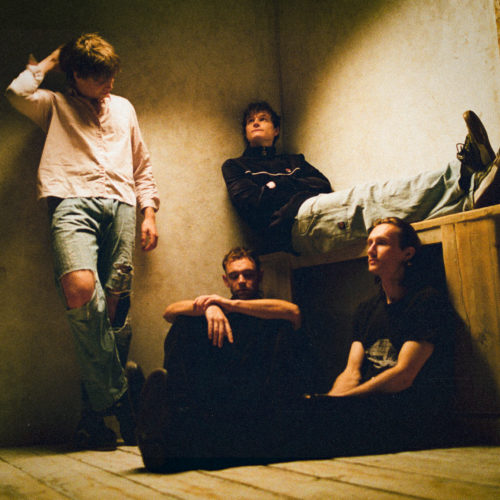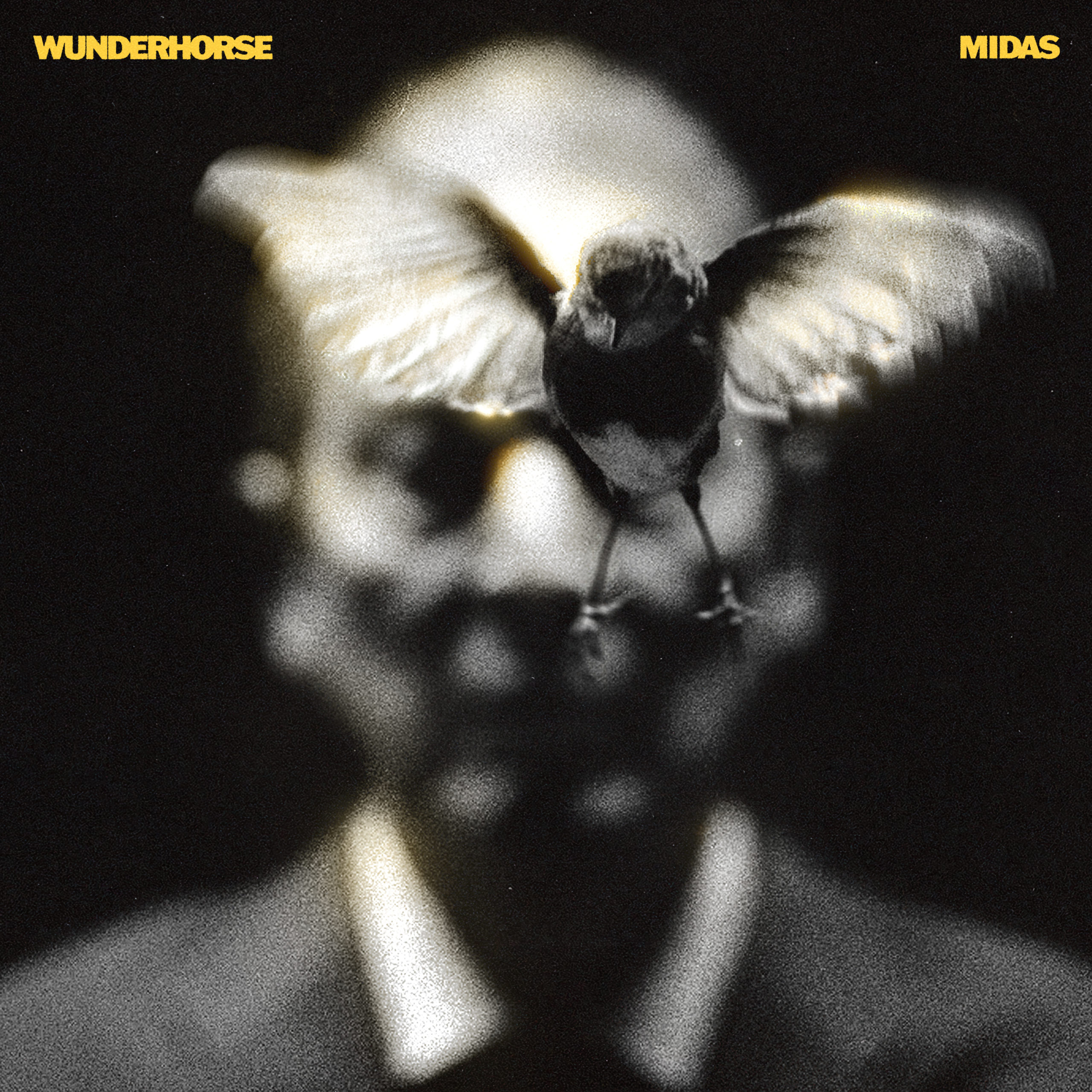
Midas
—
Out August 30, 2024
—
Communion Records



“I want it to feel like you’re right there in the room with us.” And in 10 songs and 40 minutes, Wunderhorse capture the raw power and energy that has set them apart as one of the most formidable live acts of recent years. With rugged hooks, unfiltered noise, and fierce melodic sensitivity, Midas rips up the script of traditional second albums and establishes the band as an endlessly addictive and rousing generational talent.
In late 2022, the release of their debut album Cub saw singles ‘Purple’ and ‘Leader of the Pack’ dominate radio airwaves. Landmark performances filling Glastonbury’s Woodsies Tent (FKA John Peel Stage) and selling out London’s Kentish Town Forum months in advance were followed by tours with Pixies and Fontaines D.C., signalling the band’s arrival as one of the most prominent and exciting new guitar acts in the UK. Starting life as the solo project of Jacob Slater in the summer of 2021, the raucous energy of his past as teenage frontman of London punks Dead Pretties found a new home. After burning out as quickly as they emerged in 2017, Slater took a step back from music and moved to Cornwall to pursue his love of surfing. It was there that the songs that made up Cub were written and Wunderhorse was born.
A mammoth touring schedule followed the band’s debut in 2023. Stages across Europe and the US saw them develop into a powerful live presence, with the album only gaining momentum and popularity in the year following its release. The relentlessness of the road also naturally brought the band closer together – joined by guitarist Harry Fowler, drummer Jamie Staples, and bassist Peter Woodin, Slater left the solo era of Wunderhorse behind. “The more we played together, the more everyone’s personality started to become an intrinsic part of the music,” says Slater. “The sound is now just as much a part of who they are.” Staples cites “a growing emotional investment from everyone”, while Fowler believes the process of growing into a fully-formed band is “something that we all had to earn.”
With this new formation and steadfast trust in each other, Wunderhorse headed to Pachyderm Studio in Cannon Falls, Minnesota, to embark on their first collaborative recording process. With Grammy Award-winning producer Craig Silvey (The Rolling Stones, The National, Florence + The Machine) on board, the band looked to do something different. Their goal – in the very same studio that Nirvana put In Utero to tape and PJ Harvey recorded the Mercury Prize-nominated Rid of Me – was to push themselves outside of their comfort zones.
Silvey held the band to their word. For ‘Midas’, the album’s title track and first single, Silvey had the tape running for what the band assumed was a scrappy and unformed practice take. When it was finished, he said they’d hit the jackpot. Leaning into their loose and raw live show in the studio became a guiding principle for the process that would follow. “Every time we wanted to change something or do something again, he would remind us of our aim and our mission and say, ‘Look, if that’s the kind of record you want to make, making these changes and polishing it isn’t going to serve that purpose’,” Slater says, with Fowler adding: “In some ways, Craig beat the musicianship out of all of us a little bit.” The result is an album of songs played with fire and fury, and reflective of their energy as performers.
The majority of the songs on the album were written by Slater in the studio and put to tape before that initial scrappy magic was diluted. Most songs revolve around three chords, with the distant strains of Nirvana heard all over the cacophonous and anthemic ‘Cathedrals’ and the wild ‘July’. Entering the studio “acutely aware” of the often-criticised and over-produced second album by a band on the rise, Wunderhorse shot for the absolute opposite, making an album defined by gut instinct and strength of feeling. “I think that’s something that’s been lost over the years in a lot of music,” Slater says. Wanting the listener to feel like their face is pressed right up against the speaker is a claustrophobia akin to the studio’s sound and the band’s experience of recording over the course of a month. The band switched off their phones and lived every moment, “when you’re in that environment, you don’t have a void in you that makes you feel like you want to go on your phone” says Fowler. And so, each day instead started with choosing a record from the limited studio selection and dropping the needle. These morning listening sessions – playing The Rolling Stones’ Beggars Banquet (referenced on closing track ‘Aeroplane’), The Beatles’ Rubber Soul and other classics – allowed the band to lean into a more traditional form of creativity without the trappings of exhausting competition for their attention spans.
“There’s plenty of wonderful things about the modern world,” says Slater, “but in terms of the creative processes, there are things that have been lost. I definitely noticed the difference when we employed the more traditional methods. We wrote some of our best music in the space of a month. It was a real wake-up call for how we’re going to do things in the future.” For Woodin, it was a similar recalibration: “I quite enjoy picking apart music and trying to figure out how it all fits together and not listen to it as a whole. This process completely flipped that on its head for me – I wasn’t listening for my part or anyone else’s, I was listening to the whole thing.”
This disillusionment with modernity also permeates the album’s lyrical content, as Slater explains: “As we move towards an uncertain future which is changing at an unprecedented pace, I think a lot of the aspects of what it means to be a human being are being left on the scrapheap. It’s a strange thing to wake up to every day, and it’s a strange feeling to live with. I think a lot of people probably feel like that. I know all of us in the band do.”
While these themes became apparent to the band retrospectively, Midas was largely written as a fiery snapshot straight from Slater’s gut. Over half of it was written in the studio and employs the same tactic as the music – your first idea is often your best, and is to be trusted. “I think all the best songs come in 10 minutes, and you just write down whatever comes to you,” he says. Only mid-album highlight ‘Superman’ was fully formed before the band travelled to Minnesota, a phenomenally beautiful tale of being misunderstood and underestimated.
“It’s trying to sum up the feeling of somebody who feels like their life is passing by, and they had so many things they could have done but didn’t do anything,” explains Slater, “in their head, there’s still this part of them that the rest of the world never got to see.”
Midas ends with ‘Aeroplane’, a near-nine-minute epic that epitomises the creative recalibration of Wunderhorse in this new era. Written off the cuff in the studio, the band played the acoustic track over and over with Silvey insisting that the whole take should be used. It ends with a noisy and fragmented guitar solo from Fowler that, yes, could have been polished up and given a lick of paint, but gains all its power from its rawness.
“There’s absolutely no faking on this record,” ends Slater, “it’s not supposed to be perfect; it’s supposed to be a snapshot, even if it is a bit of an ugly portrait. That’s how it was then, and that’s how you’re gonna see it.” And it sounds like you’re right there in the room with them.